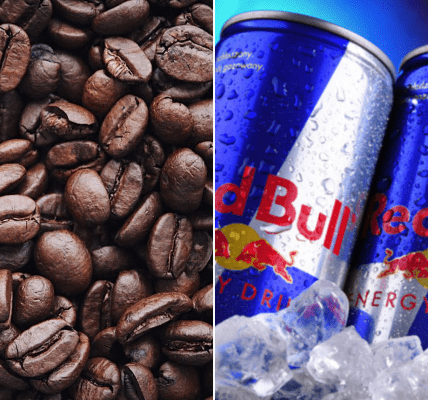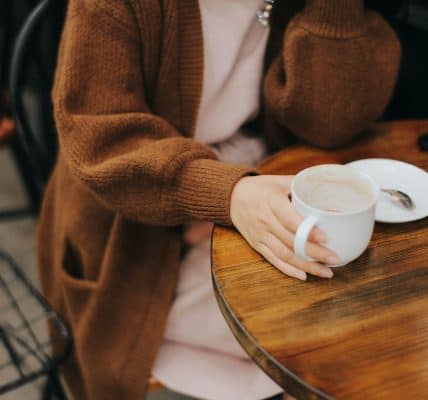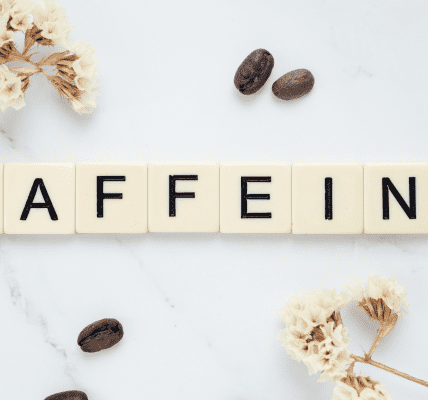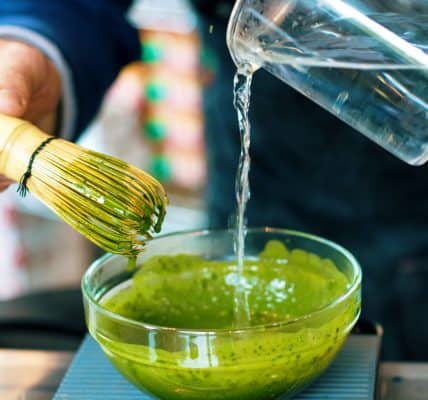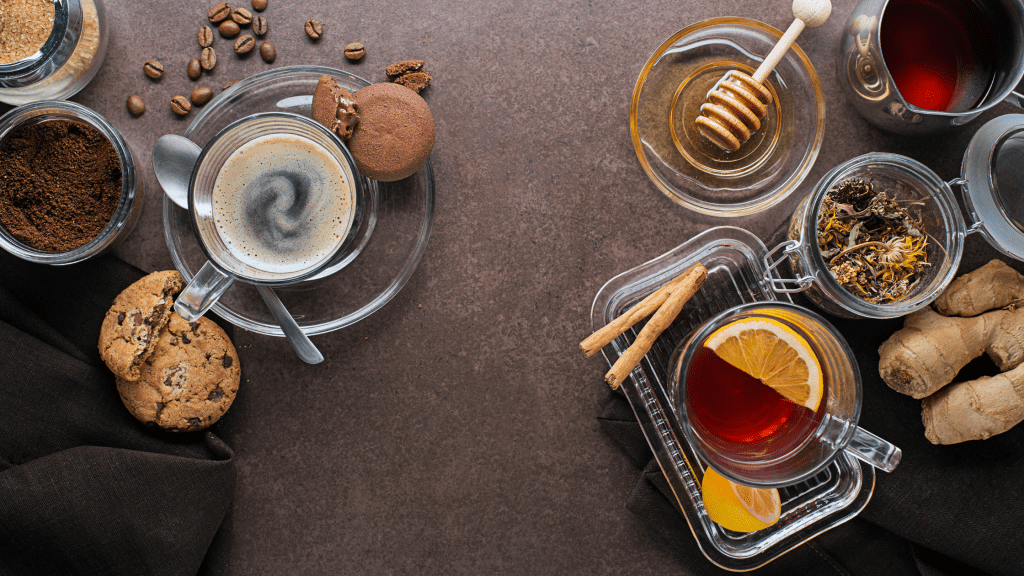
Caffeine is a methylxanthine compound that is obtained from plant leaves. And we know it in closest relation to coffee, or at most cocoa beans and hence, chocolate.
But tea also contains a considerable amount of Caffeine. In fact, the tea plant Camellia sinensis naturally contains Caffeine. And how much Caffeine does a take-a-sip cup of Tea have? It depends on the variety of Tea and your brewing process.
So, in this article, we will be discussing Caffeine in Tea and how it compares with that in Coffee. How does it depend on factors such as harvest, brewing process, or processing methods?
Since they differ in their chemical makeup, tea and coffee have very different things to offer to your body. Let’s see how.
How much Caffeine does Tea have compared to Coffee?
Table of Contents
Tea leaves contain more Caffeine than Coffee. This fact never fails to amaze and amuse us!
The results of a study published in the Czech Journal of Food Sciences tell us that tea leaves are 3.5 % concentrated with Caffeine.
At the same time, coffee beans are only 1.1 to 2.1 % caffeine. But your cup of Coffee surely contains more Caffeine than the same cup of Tea. One cup of Tea contains somewhere between 11 and 25 milligrams of Caffeine on average.
This quite varies with the variety of Tea, but it never goes beyond 70 milligrams.
The same 8-ounce cup of Coffee has to have 100 milligrams of Caffeine. And with some robust variants of coffee beans, it can go up to 200 milligrams.
So, where exactly in the process of Tea or Coffee coming to us, does this Caffeine go from here to there?
Firstly, the brewing process is different for Tea and Coffee. We use hotter water for coffee and brew it more thoroughly and faster. We go a little mild on tea, which makes the extraction of caffeine less efficient. And there is more caffeine in coffee than in tea!
Secondly, to control the taste of the tea, you would use fewer tea leaves than coffee beans for one cup of beverage.
Does Caffeine Content vary with the Type and Brewing of Tea?
The caffeine content in one cup of tea depends on two main factors:
- Variety or type of tea
- Brewing Process
Even with the same variety of tea, methods and seasons of harvest also have a major impact.
1. Variety or Type of Tea
Here are the four major types of tea with their respective caffeine content:
Type of Tea Caffeine Content
1. Black Tea 60-90 mg
2. White Tea 30-55 mg
3. Oolong Tea 50-75 mg
4. Green Tea 35-70 mg
Black tea and oolong tea (a Chinese tea variety) are caffeine-packed. Green tea is opted for its moderate caffeine content. White tea has the minimum caffeine, and it can be alternatively used with herbal or caffeine-free teas.
All these varieties of tea that we have in our common use are obtained from the same tea plant, Camellia Sinensis. But you see, none can compare with the caffeine content of coffee. Because the maximum limit of caffeine content for black tea is the lower limit for a cup of coffee!
So, how do they manage to vary the caffeine content from the same crop? This is how:
1. Plants harvested during the spring season contain more caffeine.
2. Shade-grown harvest is higher in caffeine. Shade acts as a stress signal for the plant, and for compensation, it makes more L-theanine and caffeine.
3. Exposure to air or Oxidation of tea leaves. Now, this is the variable that gives the largest amount of control.
4. Processing Method: When tea leaves are crushed and torn first and then processed to make tea, they tend to contain greater caffeine levels. Whereas when tea leaves are used as they are, caffeine extraction is less efficient.
Now we know that black tea and oolong tea tend to have greater caffeine ratios because they are made from shade-grown tea plants.
More importantly, black tea and oolong tea are processed from oxidized tea leaves that are first crushed. The opposite holds true for white tea and green tea, tea varieties loved for their minimum caffeine content.
Brewing Process
Since black tea is made using hotter water and is allowed to steep longer, it tends to have greater caffeine content.
The brewing process is also another thing that puts your coffee cup with better caffeine content. Coffee is brewed with boiling hot water or steamed milk, thus better extraction.
Coffee Varieties and Brewing
Regardless of the strength of flavor, Robusta coffee beans are packed with more caffeine than the Arabica ones. Lighter roasts are more caffeine-concentrated than darker roasts.
Irrespective of the serving size, espresso contains more caffeine than regular brewed coffee. A double espresso is self-explanatory!
Final Verdict
Caffeine content varies with the type and variety of the tea used. The same goes for coffee. But the caffeine content in one 8-ounce cup of tea will always be less than half as compared with coffee.
How can I increase the Caffeine Content in my Daily Cup of Tea?
If you are a green tea or white tea lover and want more alerting or any other caffeine benefits, you can use simple ways to increase caffeine intake.
1. Use more tea leaves.
2. Use water at a higher temperature for brewing.
3. Let it steep for a bit longer to extract more caffeine.
Is Tea Healthier than Coffee?
We are finally heading to the most decisive question of this discussion. Which one is healthier: Tea or Coffee?
We know that caffeine is a complex but quite healthy drug, if and only if kept under informed checks.
These checks include amount per day, intake schedule, tolerance, and health conditions. If it’s about keeping a check, why does it matter, tea or coffee? You can keep a check on caffeine intake through coffee too.
Is it that easy to keep tabs on caffeine addiction? Definitely not. So, first off, tea, which has almost half the caffeine as the same cup of coffee, takes the advantage here. That’s why tea lovers are seen to be less addicted than coffee drinkers, and cutting down is easier for them.
Another thing that gives a clear edge to our tea over coffee here is its L-theanine content. Apart from all the health-beneficial stimulant effects of theanine, it slows down the metabolism or breakdown of caffeine. This gives a sustained entry of caffeine into the bloodstream. And so, while you love coffee for its instant energy punch, tea has a milder and healthier way of doing so. And that is, it keeps you energized for a longer time.
The results of recent neuropharmacological research tell us something very similar. A combination of caffeine and L-theanine was seen to improve the cognitive abilities and attention span of the participants.
Final Verdict: Tea or Coffee?
So, which is healthier, tea or coffee? The answer is tea. At least that’s clearly who is striving to get out as the winner. But with the high antioxidants level of coffee, coffee may suit some people better. It will be a cherry on top if you manage to strictly control the cups of coffee you allow yourself in a day.
Which is more Acidic: Tea or Coffee?
Tea of any type is gentler on the stomach than coffee. Coffee is a potent stimulator of stomach acid secretion. Tea does that, but its effects are only mild.
Coffee is contraindicated for cases of peptic ulcer disease or acid reflux disease. But the chlorogenic acid potential of coffee is also variable.
Lighter roasts tend to have greater chlorogenic acid levels. Coffee brewed with hot water is more acidic. The finer the coffee grounds, the more acid your stomach makes!
With tea, herbal teas such as peppermint and ginger are almost neutral. They don’t like acid. At the same time, the tea varieties obtained from Camellia sinensis are mildly acidic.
Final Verdict: Tea or Coffee?
Tea, since it’s gentler on the stomach. Green tea, white tea, or even better, herbal teas will do wonders.
Is there any Tea Free from Caffeine?
Tea free from caffeine is the naturally caffeine-free one. Decaffeinated tea or coffee also contains minor amounts of caffeine.
Caffeine-free teas are herbal in nature, extracted from flowers and leaves of plants that are naturally caffeine-free.
These include chamomile, ginger, and peppermint teas. Even if you like to have coffee or caffeinated tea during the day, do a favor and replace them with these caffeine-free teas close to bedtime.
Conclusion
Coffee is the leader in caffeine-containing beverages. In comparison, the same amount of brewed tea contains half the amount of caffeine.
While coffee is rich in antioxidants, you may want to replace it now and then with a cup of tea for its milder and healthier chemistry.
Black tea will be best for those who are allowed caffeine. The rest can make great use of green tea or white tea. If you want to take no risks at all, herbal teas are there at your service!
